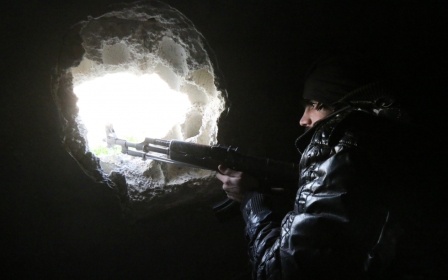Suicide bomb rocks Assad hometown as fighting rages in northern Syria

A suicide bomber killed four people in a hospital on Sunday in an attack that took Syria's civil war to the ruling Assad family’s hometown for the first time, a monitoring group said.
Two women and two soldiers as well as the bomber and an accomplice were killed in the western town of Qardaha, the Syrian Observatory for Human Rights said.
The bomb was the first explosion to hit the heart of the western town – where Syrian President Bashar al-Assad’s father, former President Hafez Assad, as well as Assad’s older brother Bassil are buried - since the outbreak of Syria's civil war in 2011, although the town outskirts have previously come under rocket fire.
The attack comes as forces loyal to Assad stepped up offensives in the north and south of the country, with fierce fighting currently rocking Syria’s second city Aleppo and the surrounding countryside.
While the ground offensive has so far failed to change the balance on the ground, Assad’s forces have continued to pound rebel-held areas.
On Saturday, two women and two children were among eight people killed when a barrel bomb hit a building in an opposition-held area of Aleppo city, once Syria's commercial capital, the Observatory said.
The UK-based watchdog also reported that Assad’s troops had executed 48 people earlier this week in the northern village of Rityan, including 10 children. The village, along with many other neighbouring villages, have now fallen back into rebel hands, including al-Qaeda’s Syria affiliate the al-Nusra Front.
The information could not be independently verified, but the area has seen fierce fighting in recent days as Assad’s troops have struggled to cut rebel supply lines to the Turkish border.
UN investigators said Friday they were prepared to publish secret lists of alleged war criminals in Syria to help stem an "exponential rise" in atrocities.
Releasing the lists would put "alleged perpetrators on notice" and could "serve to maximize the potential deterrent effect" and "help to protect people at risk of abuse," a UN commission of inquiry said in a new report.
The commission described what it deemed to be "an exponential rise in the perpetration of war crimes, crimes against humanity and human rights violations."
The commission has drawn up four lists of individuals and groups it believes are guilty of war crimes and crimes against humanity, and has kept them locked up in a safe in Geneva, out of concern for due process.
But the investigators said they were now ready to shift their approach.
The investigators are set to hand over a fifth list of suspected war criminals to the UN Human Rights Council in Geneva next month, and Paulo Sergio Pinheiro, chair of the UN international commission on Syria, said he expects a decision during the 17 March meeting on the release of the names.
More than 210,000 people have been killed in Syria and half of the population has been forced to flee their homes since the conflict erupted in March 2011.
Stay informed with MEE's newsletters
Sign up to get the latest alerts, insights and analysis, starting with Turkey Unpacked
Middle East Eye delivers independent and unrivalled coverage and analysis of the Middle East, North Africa and beyond. To learn more about republishing this content and the associated fees, please fill out this form. More about MEE can be found here.




